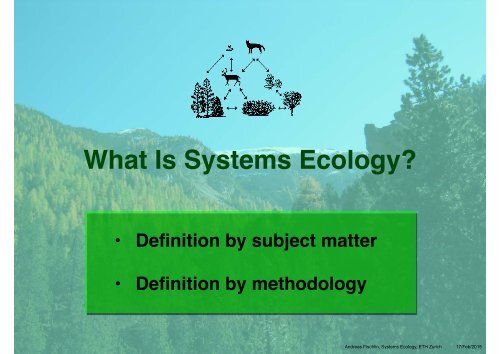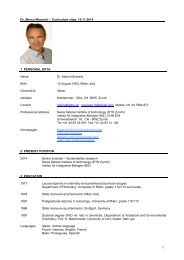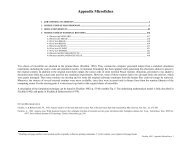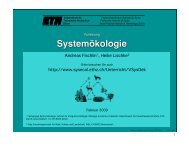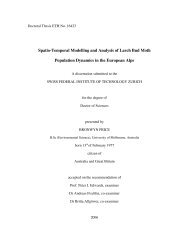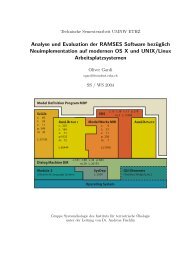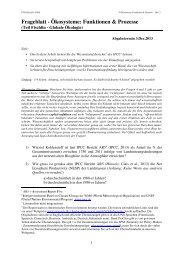What Is Systems Ecology?
What Is Systems Ecology? - Terrestrial Systems Ecology
What Is Systems Ecology? - Terrestrial Systems Ecology
- No tags were found...
You also want an ePaper? Increase the reach of your titles
YUMPU automatically turns print PDFs into web optimized ePapers that Google loves.
<strong>What</strong> <strong>Is</strong> <strong>Systems</strong> <strong>Ecology</strong>?<br />
• Definition by subject matter!<br />
• Definition by methodology<br />
Andreas Fischlin, <strong>Systems</strong> <strong>Ecology</strong>, ETH Zurich<br />
17/Feb/2015
Definition by "Subject Matter"<br />
• Subdisciplin of ecology (“<strong>Ecology</strong> studies<br />
relationships among organisms and their<br />
abiotic environment”)!<br />
• Emphasis on ecosystems (systems <br />
eccology is synecological)!<br />
• Not limited to taxa, habitat, or functions!<br />
• Includes anthropogenic aspects and human<br />
influence on ecosystems<br />
Andreas Fischlin, <strong>Systems</strong> <strong>Ecology</strong>, ETH Zurich<br />
17/Feb/2015
Definition by "Subject Matter"<br />
• Subdisciplin of ecology (“<strong>Ecology</strong> studies<br />
relationships among organisms and their<br />
abiotic environment”)!<br />
• Emphasis on ecosystems (systems <br />
eccology is synecological)!<br />
• Not limited to taxa, habitat, or functions!<br />
• Includes anthropogenic aspects and human<br />
influence on ecosystems<br />
Andreas Fischlin, <strong>Systems</strong> <strong>Ecology</strong>, ETH Zurich<br />
17/Feb/2015
Folien<br />
4<br />
Andreas Fischlin, <strong>Systems</strong> <strong>Ecology</strong>, ETH Zurich<br />
17/Feb/2015
Definition by "Subject Matter"<br />
• Subdisciplin of ecology (“<strong>Ecology</strong> studies<br />
relationships among organisms and their<br />
abiotic environment”)!<br />
• Emphasis on ecosystems (systems <br />
eccology is synecological)!<br />
• Not limited to taxa, habitat, or functions!<br />
• Includes anthropogenic aspects and human<br />
influence on ecosystems<br />
Andreas Fischlin, <strong>Systems</strong> <strong>Ecology</strong>, ETH Zurich<br />
17/Feb/2015
Folien<br />
6<br />
Andreas Fischlin, <strong>Systems</strong> <strong>Ecology</strong>, ETH Zurich<br />
17/Feb/2015
Ecosystem understood as an<br />
Ecophysiological System<br />
Ellenberg, H., Mayer, R. &<br />
Schauermann, J. (eds.), 1986.<br />
Ökosystemforschung Ergebnisse<br />
des Sollingprojekts 1966-1986.<br />
Eugen Ulmer, Stuttgart, 507pp.<br />
Andreas Fischlin, <strong>Systems</strong> <strong>Ecology</strong>, ETH Zurich<br />
17/Feb/2015
Definition by "Subject Matter"<br />
• Subdisciplin of ecology (“<strong>Ecology</strong> studies<br />
relationships among organisms and their<br />
abiotic environment”)!<br />
• Emphasis on ecosystems (systems <br />
eccology is synecological)!<br />
• Not limited to taxa, habitat, or functions!<br />
• Includes anthropogenic aspects and human<br />
influence on ecosystems<br />
Andreas Fischlin, <strong>Systems</strong> <strong>Ecology</strong>, ETH Zurich<br />
17/Feb/2015
Folien<br />
9<br />
Andreas Fischlin, <strong>Systems</strong> <strong>Ecology</strong>, ETH Zurich<br />
17/Feb/2015
Definition by "Subject Matter"<br />
• Subdisciplin of ecology (“<strong>Ecology</strong> studies<br />
relationships among organisms and their<br />
abiotic environment”)!<br />
• Emphasis on ecosystems (systems <br />
eccology is synecological)!<br />
• Not limited to taxa, habitat, or functions!<br />
• Includes anthropogenic aspects and human<br />
influence on ecosystems<br />
Andreas Fischlin, <strong>Systems</strong> <strong>Ecology</strong>, ETH Zurich<br />
17/Feb/2015
Folien<br />
11<br />
Andreas Fischlin, <strong>Systems</strong> <strong>Ecology</strong>, ETH Zurich<br />
17/Feb/2015
Definition by Methodology<br />
• Application oriented!<br />
• Modelling pivotal!<br />
• <strong>Systems</strong> approach critical (based on<br />
systems theory)!<br />
• No limitations on "classical" mathematics<br />
(complex models, simulation models)<br />
Andreas Fischlin, <strong>Systems</strong> <strong>Ecology</strong>, ETH Zurich<br />
17/Feb/2015
Definition by Methodology<br />
• Application oriented!<br />
• Modelling pivotal!<br />
• <strong>Systems</strong> approach critical (based on<br />
systems theory)!<br />
• No limitations on "classical" mathematics<br />
(complex models, simulation models)<br />
Andreas Fischlin, <strong>Systems</strong> <strong>Ecology</strong>, ETH Zurich<br />
17/Feb/2015
Folien<br />
14<br />
Andreas Fischlin, <strong>Systems</strong> <strong>Ecology</strong>, ETH Zurich<br />
17/Feb/2015
Definition by Methodology<br />
• Application oriented!<br />
• Modelling pivotal!<br />
• <strong>Systems</strong> approach critical (based on<br />
systems theory)!<br />
• No limitations on "classical" mathematics<br />
(complex models, simulation models)<br />
Andreas Fischlin, <strong>Systems</strong> <strong>Ecology</strong>, ETH Zurich<br />
17/Feb/2015
Folien<br />
16<br />
Andreas Fischlin, <strong>Systems</strong> <strong>Ecology</strong>, ETH Zurich<br />
17/Feb/2015
Definition by Methodology<br />
• Application oriented!<br />
• Modelling pivotal!<br />
• <strong>Systems</strong> approach critical (based on<br />
systems theory)!<br />
• No limitations on "classical" mathematics<br />
(complex models, simulation models)<br />
Andreas Fischlin, <strong>Systems</strong> <strong>Ecology</strong>, ETH Zurich<br />
17/Feb/2015
Short Course<br />
<strong>Systems</strong> Theory<br />
18<br />
Andreas Fischlin, <strong>Systems</strong> <strong>Ecology</strong>, ETH Zurich<br />
17/Feb/2015
Short Course <strong>Systems</strong> Theory<br />
• Model !<br />
• System!<br />
• <strong>Systems</strong> analysis and Modelling!<br />
Andreas Fischlin, <strong>Systems</strong> <strong>Ecology</strong>, ETH Zurich<br />
17/Feb/2015
Short Course <strong>Systems</strong> Theory: <br />
On Term «Model»<br />
<strong>What</strong> is a model?!<br />
– Qualitative model ≈ Verbal model"<br />
– Mathematical model"<br />
– Simulation model"<br />
Andreas Fischlin, <strong>Systems</strong> <strong>Ecology</strong>, ETH Zurich<br />
17/Feb/2015
Short Course <strong>Systems</strong> Theory: <br />
On Term «System»<br />
• <strong>What</strong> is a system?!<br />
– System border delineates system from its environment "<br />
– <strong>Systems</strong> elements"<br />
• Inputs or input variables (Eingänge,<br />
Eingangsvariablen)"<br />
• State variables (Zustandsvariablen)"<br />
• Model parameters (Modellparameter)"<br />
• Outputs or output variables (Ausgänge,<br />
Ausgangsvar.)"<br />
• Auxiliary variables (Hilfsvariablen, Hilfsgrössen)<br />
Andreas Fischlin, <strong>Systems</strong> <strong>Ecology</strong>, ETH Zurich<br />
17/Feb/2015
Short Course <strong>Systems</strong> Theory: <br />
On Terms «<strong>Systems</strong> Analysis» <br />
and «Modeling»<br />
• <strong>Systems</strong> analysis and modelling:!<br />
1.!Analysis of complex systems!<br />
2.!Model building!<br />
3.!Studying the model!<br />
4.!Drawing conclusions on the real system<br />
Andreas Fischlin, <strong>Systems</strong> <strong>Ecology</strong>, ETH Zurich<br />
17/Feb/2015
“System Dynamics” Approach<br />
Often some steps are more important than others<br />
"<br />
1! Problem question!<br />
2! Sift facts and data!<br />
3! Verbal model!<br />
4,5! Mathematical model - Calibration!<br />
6,7! Simulation model!<br />
8! Simulation experiments!<br />
9! Interpretation of simulation results!<br />
10! Model and parameter identification!<br />
11! Model validation!<br />
12! Model application (e.g. for prognosis)!<br />
Recipe <strong>Systems</strong><br />
Analysis<br />
!<br />
Andreas Fischlin, <strong>Systems</strong> <strong>Ecology</strong>, ETH Zurich<br />
17/Feb/2015
“System Dynamics” Approach<br />
Often some steps are more important than others<br />
"<br />
1! Problem question!<br />
2! Sift facts and data!<br />
Recipe <strong>Systems</strong><br />
Analysis<br />
3! Verbal model!<br />
possibly<br />
4,5! Mathematical model - Calibration!<br />
6,7! Simulation model!<br />
2<br />
possibly 2 3<br />
8! Simulation experiments!<br />
9! Interpretation of simulation results!<br />
possibly<br />
7<br />
10! Model and parameter identification!<br />
11! Model validation!<br />
possibly 2 4<br />
possibly 2 4<br />
12! Model application (e.g. for prognosis)<br />
!<br />
possibly<br />
2<br />
Andreas Fischlin, <strong>Systems</strong> <strong>Ecology</strong>, ETH Zurich<br />
17/Feb/2015
Ex.: Relational Graph<br />
d 11 ..d 14<br />
d 21 ..d 24<br />
u 1<br />
b c<br />
y<br />
b 21<br />
11 1<br />
11<br />
c c<br />
b 21 12<br />
22<br />
u 2<br />
b a 12<br />
21<br />
x 1<br />
x 2<br />
b 13<br />
a c 12<br />
22<br />
y 2<br />
u b a 11 a 22<br />
3<br />
23<br />
c 32<br />
b 14 b 24 c<br />
d 31<br />
u 31 ..d 34<br />
4<br />
y 3<br />
Andreas Fischlin, <strong>Systems</strong> <strong>Ecology</strong>, ETH Zurich<br />
17/Feb/2015
Model Equations<br />
Example Linear System<br />
δx<br />
–––– 1<br />
= a 11·x 1 + a 12·x 2 + b 11·u 1 + b 12·u 2 + b 13·u 3 + b 14·u 4 !<br />
δt<br />
"<br />
δx<br />
–––– 2<br />
= a 21·x 1 + a 22·x 2 + b 21·u 1 + b 22·u 2 + b 23·u 3 + b<br />
δt<br />
24·u 4<br />
y 1 = c 11·x 1 + c 12·x 2 + d 11·u 1 + d 12·u 2 + d 13·u 3 + d 14·u 4!<br />
y 2 = c 21·x 1 + c 22·x 2 + d 21·u 1 + d 22·u 2 + d 23·u 3 + d 24·u 4!<br />
y 3 = c 31·x 1 + c 32·x 2 + d 31·u 1 + d 32·u 2 + d 33·u 3 + d 34·u 4<br />
Andreas Fischlin, <strong>Systems</strong> <strong>Ecology</strong>, ETH Zurich<br />
17/Feb/2015
Summary<br />
• A model is a caricature that abstracts the<br />
real system!<br />
• Modeling requires a systems analysis !<br />
• There are!<br />
1.!Verbal models!<br />
2.!Mathematical models!<br />
3.!Simulation models<br />
Andreas Fischlin, <strong>Systems</strong> <strong>Ecology</strong>, ETH Zurich<br />
17/Feb/2015
Summary (Cont.)<br />
• Most models are systems !<br />
• Most objects can be regarded as a system<br />
(if elements are related among each other) !<br />
• Modeling means to build a model that is<br />
typically patterned after a real system !<br />
• A system sensu stricto consists of the nonempty<br />
system universe (≥ 1 state variable)<br />
and the non-empty structure (≥ 1 element<br />
in relation)!<br />
Andreas Fischlin, <strong>Systems</strong> <strong>Ecology</strong>, ETH Zurich<br />
17/Feb/2015
Approaches and Objectives<br />
• <strong>Systems</strong> analysis<br />
<br />
<br />
• „Prognosis“<br />
<br />
<br />
Clarifies what is known; Integration;<br />
detects knowledge gaps;<br />
Optimization; Experiment design;<br />
Sample size<br />
Projection, If-then answers<br />
(Future, Risk avoidance,<br />
Estimates, Reducing costs)<br />
• <strong>Systems</strong><br />
synthesis<br />
Control design, System<br />
amendment, System<br />
manipulation or control<br />
Andreas Fischlin, <strong>Systems</strong> <strong>Ecology</strong>, ETH Zurich<br />
17/Feb/2015
Short Course<br />
<strong>Systems</strong> Theory<br />
Andreas Fischlin, <strong>Systems</strong> <strong>Ecology</strong>, ETH Zurich<br />
17/Feb/2015
Definition by Methodology<br />
• Application oriented!<br />
• Modelling pivotal!<br />
• <strong>Systems</strong> approach critical (based on<br />
systems theory)!<br />
• No limitations on "classical" mathematics<br />
(complex models, simulation models)<br />
Andreas Fischlin, <strong>Systems</strong> <strong>Ecology</strong>, ETH Zurich<br />
17/Feb/2015
Demo<br />
32<br />
Andreas Fischlin, <strong>Systems</strong> <strong>Ecology</strong>, ETH Zurich<br />
17/Feb/2015
Summary <strong>Systems</strong> <strong>Ecology</strong><br />
• Subdiscipline of ecology!<br />
• Studies eco- and population systems!<br />
• Holistic approach (multi-scale)!<br />
• Application oriented!<br />
• Based on systems theory!<br />
• Modelling / systems analysis pivotal!<br />
• Realistic vs. classic math!<br />
Andreas Fischlin, <strong>Systems</strong> <strong>Ecology</strong>, ETH Zurich<br />
17/Feb/2015
Course Overview<br />
• Introduction/Basic Terms<br />
• <strong>Systems</strong> <strong>Ecology</strong> Case Studies: Motto -<br />
1,2,3 from the simple to the complex<br />
Insertion: Simulation tool <br />
«Easy ModelWorks»<br />
• Fundamentals of <strong>Systems</strong> Theory: <br />
Modeling, System Representation, Stability<br />
analysis, Simulation<br />
• Ecosystem models from recent research:<br />
agroecosystems, climate and forests etc.<br />
Andreas Fischlin, <strong>Systems</strong> <strong>Ecology</strong>, ETH Zurich<br />
17/Feb/2015


